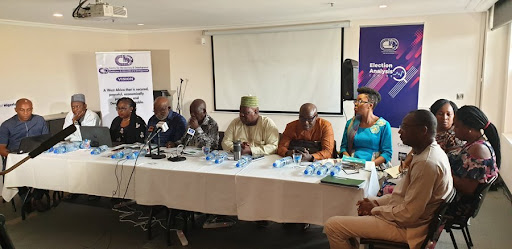Nigeria Elections 2023: Social Media Influence On Politics “Stronger” – CDD
With the growth of Nigeria’s social media users and the rise of disinformation across different platforms, observers are concerned about possible effects on the 2023 general elections.

Last Tuesday, Aisha Buhari, the wife of Nigeria’s outgoing president, Muhammadu Buhari, posted on her verified Instagram account that Nigeria’s apex bank was reintroducing the old 200, 500, and 1000 notes as legal tender. Before the bank dismissed it as false, disinformation’s role in the country’s February polls had unsettled stakeholders.
Though the post was deleted after the CBN debunked the story, it was ‘liked’ by 1,791 of her 592,000 followers in 42 minutes. It was screenshotted by many users and cross-shared on multiple social media platforms, especially WhatsApp, in a short amount of time.
Think-tanks like the Centre for Democracy and Development (CDD) have raised concerns over how ‘influencers’ hired by political actors fabricate stories, forge infographics, and cook up fact-checks to delude gullible users of social media.
In a report titled Nigeria 2023 Decides: Disinformation Brief, CDD noted that there are three main drivers of disinformation in the country: content that promotes candidates, attacks on political opponents, and efforts to undermine electoral institutions.
It further added, “Some attacks on opponents and the promotion of candidates have been instrumentalised to entrench pre-existing social cleavages around ethnicity and religion.”
According to the CDD, the 2015 general elections were arguably the first time “digital tools really came to the fore, with the then opposition All Progressives Congress (APC) launching ‘The Broom’, a social media platform for its supporters and taking advantage of the digital space that was largely unoccupied and uncontrolled by the ruling party. By 2019, both leading parties had a clear and growing online presence with coordinated disinformation campaigns aimed at manipulating public opinion and drawing clear divisions between party supporters and political opponents.”
Foreign firms, Cambridge Analytica in 2015 and Archimedes in 2019, were fingered in the manipulation of opinions in the country, though the watchdog said for the most part, “they were domestic operations directed by party activists and social media influencers, both at home and in the diaspora.”
Another menace is cross-posting across social media platforms, a feature that makes it easier for one to be heard or seen on multiple platforms at a time. This enables one to have visibility and reach many audiences at a time.
In the previous elections, TikTok had not gained currency in Nigeria, and Twitter Spaces had not yet been introduced. In the upcoming polls, experts predict they might play a role in the elections as they make disinformation easier to spread.
“This is particularly the case for TikTok, which has grown in prominence in the 2023 election campaign despite a relatively small user base. Politicians and their social media advisors are now using TikTok, particularly to reach new audiences. They often promote derogatory political songs or create challenges around the candidates or campaigns. The visually appealing content can resonate with those individuals that have limited levels of education when it comes to reading and writing.
“Twitter Spaces, in particular, are a much-used feature in Nigeria’s electoral politics. All political parties organise almost daily discussions hosted by hired social media influencers or party activists, in which efforts are made to delegitimise opponents, boost the profile of their candidate and galvanise supporters and would-be voters to cast a ballot.
“The oral nature of the discussions and the difficulty in moderating them means that they have become places where disinformation is rampant. But WhatsApp remains the medium through which all social media content really circulates widely through cross-posting and screenshots from other platforms. Furthermore, this is the application that facilitates the jump into offline spaces where non-smartphone users will begin debating and discussing news that has originated online,” the statement by CDD said.
CDD has been monitoring elections in Nigeria since 1999, and has a depth of experience in analysing these trends.
But security agencies like the Department of State Services (DSS) have also warned that fake news may affect the outcome of the 2023 general elections.
In June last year, Peter Afunanya, spokesman for the DSS said: “Slanting news to achieve ulterior motives should be avoided and I want to assure that the DSS won’t abdicate its responsibilities and would continue to do the right thing no matter whose ox is gored.”
Support Our Journalism
There are millions of ordinary people affected by conflict in Africa whose stories are missing in the mainstream media. HumAngle is determined to tell those challenging and under-reported stories, hoping that the people impacted by these conflicts will find the safety and security they deserve.
To ensure that we continue to provide public service coverage, we have a small favour to ask you. We want you to be part of our journalistic endeavour by contributing a token to us.
Your donation will further promote a robust, free, and independent media.
Donate HereStay Closer To The Stories That Matter




